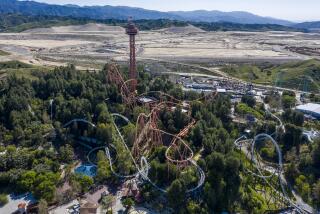Six Flags Asks for Study on Coaster Injuries
- Share via
A major amusement-park operator is entering the debate over whether roller coasters can cause brain injuries by asking a physician’s group to study the issue.
Six Flags President Gary Story said he believes a study he requested by the American Assn. of Neurological Surgeons will reinforce what amusement park officials have said all along--that roller coasters are one of the safest forms of recreation.
Until now, the industry has been trying to put the controversy to rest by arguing that brain injuries at amusement parks involve people with preexisting conditions. That appeared to be the case last summer when two people died after riding roller coasters, one at Six Flags Magic Mountain in Valencia, the other at Knott’s Berry Farm in Buena Park. Without scientific study, roller coaster proponents and critics have been unable to engage in a serious safety debate.
“These rides are given the same precision that a fine race car, that a space shuttle, that bullet trains are given,” Story said. His company operates 39 theme parks, including Magic Mountain.
“The safety of this equipment is studied inside out,” Story said. “In every public debate, there are at least two sides. We feel it is incumbent upon us to give the truth a fair hearing.”
The surgeon’s group has not yet agreed to conduct the study.
Story’s request comes on the heels of an announcement by the Brain Injury Assn. of America that it is forming a panel of experts to examine the possible link between roller coasters and brain injuries. The association is doing so at the urging of Rep. Edward J. Markey (D-Mass.), who has proposed stricter regulation of amusement-park rides.
The Brain Injury Assn. is an advocacy and prevention group and could bring its own biases to the study, Story said.
“The people of America should listen to people that really understand the human brain--the American Assn. of Neurological Surgeons. Who would you believe?”
The Brain Injury Assn.’s president, Allen Bergman, acknowledged that his group is in the “advocacy ballgame,” but said it has extended an invitation to industry-recommended experts to sit on the panel.
“This is not a witch hunt,” Bergman said. “Our intent here is strictly to review the literature and analyze the science: What do we know, what don’t we know and what do we need to know?”
Markey said he welcomes any additional study that will explain the apparent increase in brain injuries on roller coasters. A January article in the Annals of Emergency Medicine highlighted 16 cases, saying it had found a disturbing trend: one case in 1979, none in the 1980s, 14 in the 1990s and one through August 2000.
“I am pleased that Six Flags has taken an interest in lifting the veil of secrecy that has so far prevented the facts from coming to light,” Markey said.
“We all have an interest in ensuring that no patron should visit Six Flags for a pleasant vacation but leave for a very unpleasant operation....This issue has been ignored for years. Perhaps now it will receive the attention it demands.”
Stan Pelofsky, president of the American Assn. of Neurological Surgeons, said the question of whether to undertake a study is in the “early discussion stage.” His group cannot answer whether it will go ahead “until someone really steps up and says, ‘We want the study done and here are the funds to get it done.’” Markey has authored a bill that would require amusement parks to report serious injuries to the federal government and give it the authority to investigate accidents. That bill has stalled but draws attention each time there is a serious accident.



